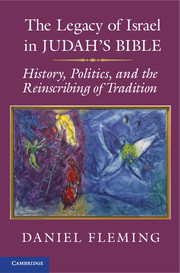Book contents
- Frontmatter
- Contents
- Preface
- Acknowledgments
- List of Abbreviations
- Part I Introduction
- Part II Israelite Content in the Bible
- Part III Collaborative Politics
- Part IV Israel in History
- 15 The Power of a Name
- 16 Before Israel
- 17 Israel and Canaan in the Thirteenth to Tenth Centuries
- 18 Israel and Its Kings
- 19 Genuine (versus Invented) Tradition in the Bible
- Bibliography
- Index of Biblical Texts
- Index of Near Eastern Texts
- Subject Index
- References
18 - Israel and Its Kings
Published online by Cambridge University Press: 05 August 2012
- Frontmatter
- Contents
- Preface
- Acknowledgments
- List of Abbreviations
- Part I Introduction
- Part II Israelite Content in the Bible
- Part III Collaborative Politics
- Part IV Israel in History
- 15 The Power of a Name
- 16 Before Israel
- 17 Israel and Canaan in the Thirteenth to Tenth Centuries
- 18 Israel and Its Kings
- 19 Genuine (versus Invented) Tradition in the Bible
- Bibliography
- Index of Biblical Texts
- Index of Near Eastern Texts
- Subject Index
- References
Summary
The books of Samuel and Kings bring the Bible's primary narrative to a close with a more obvious perspective from the kingdom of Judah. Judah's final collapse brings the narrative to an end in 2 Kings 24–5, and the possibility that David's house could be restored is kept open by Jehoiachin's place at the Babylonian royal table in the last lines (25:27–30). Throughout the books of Kings, attention bounces back and forth between Israel and Judah, but Israel's kings are burdened with the constant reminder of Jeroboam's religious failure with the calves at Dan and Bethel (1 Kings 14:28; etc.), and only Judah's rulers have the capacity to please Yahweh fully, like David (1 Kings 14:11; etc.). The books of Samuel provide a background for this account of kings by introducing David as heroic founder. Although the David narrative is constructed from material that identifies him entirely by rule over Israel, its combination with the books of Kings makes clear the ultimate preoccupation of the writers with the royal house of Judah, which kept authority through all the centuries of this kingdom.
As we move to the first millennium, the relationship of the Bible to history may at first seem more straightforward than with the earlier narrative. At least these books present Israel as a kingdom, a name and form familiar to the ninth-century texts outside the Bible. Archaeologists and historians debate the utility of Samuel and Kings for historical study, with particular energy surrounding the possible extent of a realm for David and Solomon. My immediate interest is rather the way in which the political structures of the biblical narrative shape historical interpretation, whether more or less is believed of the Bible's content. Faced with direct knowledge only of the two kingdoms in their later forms, the compilers produced a scheme for monarchy as a whole that resolved all tensions by two names, Israel and Judah. The writers’ own realm in the south was named Judah, and they portrayed the kingdom as maintaining this identity from the first moment of division at the time of Rehoboam. While the other kingdom may have borne more than one name, including the regional label Ephraim (Isa. 7:17; Hos. 4:17; etc.), the writers chose the broader designation as Israel to provide a stable identity in parallel to Judah.
- Type
- Chapter
- Information
- The Legacy of Israel in Judah's BibleHistory, Politics, and the Reinscribing of Tradition, pp. 290 - 303Publisher: Cambridge University PressPrint publication year: 2012



